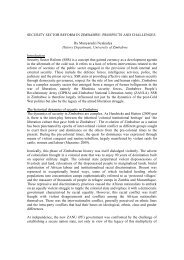National youth service training - Solidarity Peace Trust
National youth service training - Solidarity Peace Trust
National youth service training - Solidarity Peace Trust
Create successful ePaper yourself
Turn your PDF publications into a flip-book with our unique Google optimized e-Paper software.
Youth Militia and Rural District Council Elections<br />
In Matabeleland, even as the first group of militia was being forced out of sight by government,<br />
without gratuities or jobs, a new intake of <strong>youth</strong> was being trained in the major <strong>training</strong> base north of<br />
Bulawayo. These <strong>youth</strong> were then deployed to rural business centres ahead of the Rural District<br />
Council elections on 28 th and 29 th September 2002.<br />
The Zimbabwe Electoral Supervisory Network (ZESN) has underlined the significance of these<br />
elections: “To ZANU-PF the election was conceded to be a battle for supremacy and political space.<br />
As a ruling party, its aim was to consolidate power at all levels of governance starting from central to<br />
local governance using any means at their disposal.” 103<br />
It has become apparent to those documenting human rights abuses, that the rural areas remain most<br />
vulnerable to political intimidation. Throughout 2002, systematic attacks by war veterans and <strong>youth</strong><br />
militia occurred particularly in rural ZANU-PF stronghold areas such as Mashonaland and parts of the<br />
Midlands. Nkayi, Hwange and Binga in Matabeleland are also well documented for high levels of state<br />
organised violence. 104<br />
Youth militia and the RDC election campaign<br />
The Rural District Council elections set for September 2002 were considered key by ZANU-PF, who<br />
needed to hold these areas to compensate for the erosion of their control in urban areas. The desperate<br />
food situation and the need to control food distribution through control of rural district councils gave<br />
these elections added importance. 105 The Zimbabwe Electoral Supervisory Network commented that<br />
“[t]he land issue, the drought and the accompanying food crisis has provided an excellent opportunity<br />
for the ruling party to exploit the rural masses and manipulate voters into voting them back into<br />
power.” 106 It described the RDC elections as dominated by “fear of hunger and fear of assault” 107<br />
Youth militia once more played a crucial role in the intimidation of both MDC candidates and their<br />
supporters before, during and after the RDC elections. 108 Their activities included:<br />
• Attacks on life and property of prospective candidates, resulting in the withdrawal of the vast<br />
majority of MDC candidates from the election before the vote. In Manicaland alone, 100<br />
candidates withdrew their candidature after attacks and threats, including by <strong>youth</strong> militia. 109<br />
• Camping at the entrance to polling stations, monitoring those entering, and telling them who to<br />
vote for. The militia also wrote down number plates of vehicles, particularly of observers. 110<br />
103 Zimbabwe Electoral Supervisory Network (ZESN), “Report on Local Authority Election 28-29 September 2002”, pg 4.<br />
104 Amnesty International press release, 8 August 2002: “Zimbabwe: political violence intensifies ahead of September local<br />
elections”. See also PHR-DK reports and Zimbabwe Human Rights NGO Forum reports.<br />
105 Physicians for Human Rights, Denmark: Vote ZANU-PF or starve: Zimbabwe August to October 2002, Johannesburg,<br />
20 November 2002.<br />
106 ZESN, ibid, p. 7<br />
107 ZESN, ibid. p. 8<br />
108 ZESN, ibid. pp. 7, 8, 10, 11, 16; Physicians for Human Rights, Denmark: Vote ZANU-PF or starve: Zimbabwe August to<br />
October 2002, Johannesburg, 20 November 2002 , pp. 12-16, 49-50.<br />
109 ZESN, ibid p. 8. Out of 1397 seats countrywide, MDC in the end contested only 646, giving ZANU-PF a clear majority<br />
before a single vote was cast. Not only <strong>youth</strong> militia, but also war veterans, women’s league and others took part in the<br />
attacks.<br />
110 ZESN, ibid. p. 10<br />
39




